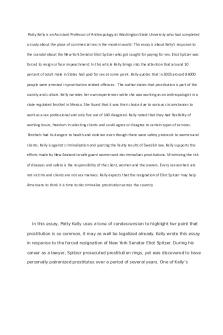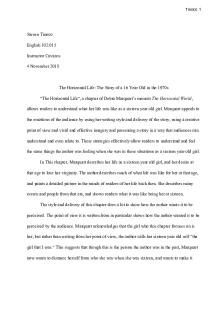Rhetorical Analysis - Grade: A PDF

| Title | Rhetorical Analysis - Grade: A |
|---|---|
| Course | Engl Lang Institute-Non-Credit |
| Institution | Eastern Washington University |
| Pages | 5 |
| File Size | 68.2 KB |
| File Type | |
| Total Downloads | 66 |
| Total Views | 172 |
Summary
Essay...
Description
Patel 1
Shreya Patel English 201 Summer 2018 A Rhetorical Analysis of “The Flight from Conversation” In my analysis, I will focus on “The Flight from Conversation” by Sherry Turkle. In this article, Turkle argues that due to the technologies of smartphones and social media, people spend more time on their digital devices than interacting with each other in person. Therefore, she calls her article, "the flight from conversation." She has been studying the way people are plugged in for the last 15 years. She believes that the little devices we carry around are so powerful that they change not only what we do, but also who we are. And this is what I see in my everyday life, people who get an new iPhone are somewhat manipulated because they can’t take their eyes off it. Her students say, “Maintaining eye contact with someone while you text someone else; it’s hard, but it can be done.” But is it really the smartest thing to do? I believe it’s not professional. Turkle discusses that the human-kind doesn’t have in person conversations, relies on technology way too much, and people don’t hear you out. Turkle points out that some people never had a real one on one conversation before, and I’m not talking about cell phone conversations. A 16-year old boy that she interviewed said: “Someday, someday, but certainly, not now, I’d like to learn how to have a conversation.” Turkle sees today’s workplace as modern people who have grown up fearing conversation present themselves on the job wearing items such as earphones. And it doesn’t stop there, she continues to add some personal experiences, walking through a college library or around campus, she says
Patel 2
you will see the same thing; but we are all in our own bubble, strongly connected to keyboards and tiny touch screens. It seems like Turkle knows who the audience is and that would be college students. To me, it seems like she’s warning college students of the outcomes of being brainwashed. Next, she interviewed a senior partner at a Boston law firm, he describes a scene in his office. "Young associates lay out their suite of technologies: laptops, iPods and multiple phones. And then they put their earphones on. Big ones. Like pilots. They turn their desks into cockpits. With the young lawyers in their cockpits, the office is quiet, a quiet that does not ask to be broken." Turkle goes more in-depth on how we revolve in bubbles that only consist of ourselves. But in my world, it’s just professional business people trying to make a better future for us all, to portray that they must be in a quiet setting to their likings. To continue, she says “We have gotten used to the idea of being in a tribe of one, loyal to our own party.” And to break it down for you, she says because many people don’t know how to get out of that party they tend to struggle on adapting to reality. The only thing I disagree with that statement of us being “loyal to our own party” Is that I believe it’s more of an “addiction” and people truly don’t know how to escape it. She acts like there’s no way out, but, there’s many ways to get out of it. Having a simple one on one conversation in person isn’t that hard to achieve. To conclude, Turkle provided enough evidence on how people don’t have real conversations. Next, Turkle also points out that we always rely on technology to keep us together. “We can’t get enough of one another if we can use technology to keep one another at distances we can control: not too close, not too far, just right. I think of it as a Goldilocks effect.” At first, I was confused because not many people or none know about the Goldilocks effect which is basically saying everyone has their own preference of communication, for some it may be technology while for others it might be meeting in person. Turkle is basically saying, we can’t live without
Patel 3
technology because many have friendships with people that live across the world or just far away, so we must rely on technology to maintain a friendship. Which is accurate because I see my family relying on technology due to the fact of having family that lives across the world. Turkle states, “Texting and e-mail and posting let us present the self we want to be. This means we can edit. And if we wish to, we can delete. Or retouch: the voice, the flesh, the face, the body. Not too much, not too little — just right.” Turkle is pointing out that although online we can make edits to messages without that person finding out, we cannot do it in real life. For example, doing an interview without turning in a resume, you’re basically put on the spot and if you mess up, then you mess up. And this is still referencing the Goldilocks theory she was talking about, we’re maintaining a life that’s just right. I think for me, I prefer the online world because we can edit messages and in real life we tend to say stuff that we can’t delete or edit. “Human relationships are rich; they’re messy and demanding. We have learned the habit of cleaning them up with technology.” Sadly, her statement is true, and I can't just help myself but to agree with it. Turkle continues to argue about how much we rely on technology to fix our messes and it’s ridiculous that people don’t know how to fix their messes in person. “Connecting in sips may work for gathering discrete bits of information or for saying, “I am thinking about you.” Or even for saying, “I love you.” But connecting in sips doesn’t work as well when it comes to understanding and knowing one another” Turkle is really passionate about saying meaningful words in person rather than using technology. And even though I started that I prefer the online world, saying stuff that only can be meaningful in real life such as “I love you” can only bring you feelings in real life. Because we tend to understand that person more better because of their tone of voice and actions, if we use the technology we can’t express our tone. Another example would be proposing, proposing via text message isn’t the same as doing it in
Patel 4
real life because you can’t truly see the persons emotions. In conclusion, Turkle provided enough evidence on how people always rely on technology to keep us together. Finally, Turkle also points out one main thing, having someone who will listen when others won't. Turkle has been researching people and their relationship with technology. She says we often hear people say, “No one is listening to me” and she believes that what Facebook or a twitter feed is for, to rant on. I somewhat agree with her because when I was younger I would use Facebook to rant but as I got older I realized it was childish. Like Turkle said, so many of us are willing to talk to these machines that seem to care about us. But, they really don’t because they don’t give their input on the situation. From what I’ve been reading so far from this article is that it’s mostly kids and young adults that are being affected by this. However, slowly the elderly is going to be affected because apparently, researchers around the world are inventing sociable robots. “One of the most haunting experiences during my research came when I brought one of these robots, designed in the shape of a baby seal, to an elder-care facility, and an older woman began to talk to it about the loss of her child. The woman was comforted.” Although hearing about this makes me quite sad, wouldn’t it be better to hear people’s words of wisdom rather than talking to a robot? I can’t help but be confused, Turkle has been arguing that people rely on technology for communication but builds robots? It seems like she’s two-sided on this subject. To me, it seems like she wants the reader to know that she’s experimenting on this subject and is planning on ideas to prevent extreme communication loss. Yet she still argues that we are at the point where people talk about love and loss with a machine that has absolutely no experience. For one thing, we can both agree that we have lost so much confidence that we are at the point of talking to machinery. In conclusion, Turkle provided enough evidence on how people tend to have a relationship with technology and machinery.
Patel 5
Turkle’s final statement is that she is a partisan for conversation. She believes that we can demonstrate the value of conversation with children but in general, anywhere. But there was one thing that she wanted to be stuck in our heads, the thought of us listening to one another, even if it’s boring because it is often in unedited moments, where we reveal ourselves to one another. And I really do agree with her because like I said earlier, saying “I love you” in person is better than saying it via text message because in person you can truly hear the other persons tone and how they truly feel. I’m a firm believer on having important conversations in person, but when it comes to having family that lives across the world then I side with technology and I rely on it in that case. I want to further my research by discussing the potential risks of technology that can harm the American mind. I plan on using scholarly sources to back up my argument....
Similar Free PDFs

Rhetorical Analysis - Grade: A
- 5 Pages

Rhetorical Analysis of a Movie
- 5 Pages

Rhetorical Analysis
- 5 Pages

Rhetorical analysis
- 2 Pages

Steeple analysis - Grade: A
- 4 Pages

Scene Analysis - Grade: A
- 6 Pages

Theorical Analysis - Grade: A
- 17 Pages

Swot Analysis - Grade: A
- 4 Pages

Puppy Rhetorical Analysis
- 4 Pages

Rhetorical analysis -1
- 4 Pages

Bowling Dana Rhetorical Analysis
- 4 Pages

Rhetorical Analysis Essay
- 5 Pages

Textual Rhetorical Analysis
- 3 Pages

Rhetorical Analysis Final
- 5 Pages
Popular Institutions
- Tinajero National High School - Annex
- Politeknik Caltex Riau
- Yokohama City University
- SGT University
- University of Al-Qadisiyah
- Divine Word College of Vigan
- Techniek College Rotterdam
- Universidade de Santiago
- Universiti Teknologi MARA Cawangan Johor Kampus Pasir Gudang
- Poltekkes Kemenkes Yogyakarta
- Baguio City National High School
- Colegio san marcos
- preparatoria uno
- Centro de Bachillerato Tecnológico Industrial y de Servicios No. 107
- Dalian Maritime University
- Quang Trung Secondary School
- Colegio Tecnológico en Informática
- Corporación Regional de Educación Superior
- Grupo CEDVA
- Dar Al Uloom University
- Centro de Estudios Preuniversitarios de la Universidad Nacional de Ingeniería
- 上智大学
- Aakash International School, Nuna Majara
- San Felipe Neri Catholic School
- Kang Chiao International School - New Taipei City
- Misamis Occidental National High School
- Institución Educativa Escuela Normal Juan Ladrilleros
- Kolehiyo ng Pantukan
- Batanes State College
- Instituto Continental
- Sekolah Menengah Kejuruan Kesehatan Kaltara (Tarakan)
- Colegio de La Inmaculada Concepcion - Cebu

